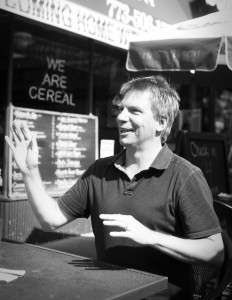photo by Andrew Gill
Current Projects: 1001 Afternoons in Chicago (released on October 1st, 2014), String Orchestra Commission from UW Whitewater, Access Contemporary Music (ACM), Thirsty Ear Festival, Relevant Tones radio show at WFMT.
Interview by Annie Higgins
I’m sitting here with Seth Boustead, a Chicago composer, Executive Director and Founder of Access Contemporary Music (ACM), radio host of Relevant Tones, which is a nationally syndicated radio show on WFMT that features contemporary classical music, Founder of Thirsty Ear Festival, Founder of Sound Silent Film Festival, Ted Talks (x) speaker in 2011, which you spoke on the future of classical music, and then fill in the blanks for me there with the composing that you’ve done..
Composing-wise that’s a funny thing because for an academically trained composer, I never went the academic route so this is where normally composers would tell you the awards they’ve won and I since I haven’t won any…. (laughs).
You’ve been a finalist though.
Yeah, and that experience, when I saw who won it reminded why I stopped entering these things in the first place; because it was all people who had won other awards and I was like, it’s really not about the music. I feel with a complete absence of malice that competitions exist to glorify themselves in a way, so it’s in their best interests to give it to these big names so that they can say, “look at our competition and who has won it.” So anyway, I’ve decided that I don’t really want to win awards, although the cash would be nice (laughs).
Let’s be real here.
Yes. Some of them have nice cash prizes. But anyway, as far as the composing goes, I’m probably the most proud of the radio play (1001 Afternoons in Chicago), I’m working on a string orchestra piece right now, the piano concerto, those things, you know, that I’m just doing on my own for fun, I’m pretty happy about.
Awesome.
Oh, really trying to find a 45 minutes set of my own music that’s within my playing ability, to start presenting my own music. The real weakness of being a classical composer is that you always need other people to play your music. Unless it’s eighth blackbird, or a handful of other ensembles, there will probably be only 20-30 people there, and they’re probably people who have already heard your music, so you’re constantly trapped within this little bubble. This is a big project/experiment for me to see can I start presenting relatively short sets of my own music, will they be successful, and can I be successful on my own terms too? Not trying to change the music to adapt it to a specific scenario but playing what my music is, in any given place, explaining it accurately enough and presenting it well that people get it and like it.
Yeah, that makes sense.
So it’s kind of a big new direction for me.
That leads me to wonder, what led you to that?
It’s kind of been coming slowly. I have to be honest, I’ve spent the last 15 years pretty confused (laughs), you know? Because I’ve always felt like I didn’t quite fit in. I really wanted to write music, that’s really what I wanted to do, for acoustic instruments, and I have been all along. Although I’m friends with a lot of indie rock people and rock musicians, I never really spent much time trying to learn to play in bands cause I was always spending my time trying to learn how to write for these instruments I don’t play (laughs), like the clarinet, and the violin, and the cello. But then I never really felt like I fit in with the composers in the academic world, either because they were so obsessed with their careers and “if I don’t win this big award by the time I’m 40 I’m going to shoot myself.” These are actual things you hear people say in my world, you know?
Yeah, it’s competitiveness on a different level.
And getting tenure at college and all that stuff. And so I felt in many ways, kind of like what Maria, my wife, says with Po Campo (the company she started), it was hard for her in the beginning to make bike bags for women who bike that attach to bikes because nobody knew why this need existed. That’s how I felt, all these years ago. It’s hard to be a composer, writing for other people, when the ensembles who will play my music don’t exist yet. They just didn’t really exist when I was getting out of school in 2002, you know?
That’s pretty insightful.
That was a big thing. Most of the music was being played at the universities, at that time. And I just felt so stifled there. And they never liked my stuff because it’s tonal and it’s not experimental. There’s a big thing in classical music that you should always be improving or adding upon the previous generation. So, for example, I’ve had teachers actually tell me, “don’t write an A minor chord, because it’s been done.” It’s obviously a ludicrous thing to say, but I was young. I was in my early early 20’s and I was impressionable and so I believed them. So it’s like, “well, shit…” you know? But what you are truly going to do that’s never been done before? Set the piano on fire? It’s been done. Play the piano in space? It’s been done. All of this stuff has been done. My argument has always been that we need to just go back to self expression and let the critics and the musicologist worry about whether I broke new ground or not. And if I didn’t, who cares because Lady Gaga’s A minor chord will never be the same as Mozart’s A minor chord, will never be the same as my A minor chord. But it was only five years ago that I had that realization. I was still laboring under these delusions. Music school taught me so much but it also really irreparably harmed me in some respects too (laughs) because I was really laboring under these very hurtful ideas, you know. And since I’m not really an experimental composer, it was very hard for me there. My teacher’s were just constantly saying, “you’ve got to push out, you’ve got to push out, you’ve got to push out.”
Trying to make you be something you weren’t?
Right.
Because of the pressures of the genre, you think?
Yeah, because of the pressures of the academic mindset. Because academia, across the board, no matter what the field, is about publishing and about discovering new things. If you’re in medicine, you discover a new vaccine; if you’re a historian, you want to discover the new manuscript that sheds new light on Lincoln. You know, whatever it is. So when they applied that thinking to music, it did some pretty bizarre things, quite frankly, when you think about it. Stockhausen was a great composer because nobody had written a string quartet for four string instruments in four helicopters. Despite the fact that it’s a ludicrous idea and you can’t hear the musicians over the helicopters (laughs), it was a new idea.
It broke new ground.
It broke new ground, right. As I keep saying to everybody, once John Cage came along, and took everything to completely aleatoric chance level, he freed us, in my opinion. We no longer need to try to do new things. Cage already took that idea and extrapolated it to it’s furthest possible realm; which is either complete silence or complete chance.
All you do is can fill in the nuances in between.
Right. And the music that I wanted to write, I always think of it like a sonic, emotionally landscape. My music’s very emotional; it will change constantly the way emotions do, there are three or four emotions at once. That’s why I was drawn to music in the first place. I really like literature but I never really felt I could write a story and capture those competing emotions at the same time, and you can do that in music. That’s the amazing thing about music. It can be somehow wistful and angry at the same time.
Totally.
So anyway, I’ve been very confused all these years (laughs).
I think you answered like 8 of my questions in one (laughs). I’m kidding.
(Laughs). I’ve only recently thought to myself, it’s more important in a way, to go out and fail than it is to go out and succeed. What I mean by that is I’ve gone out and failed as a piano player and seen people not really care, or still support me, and the sky didn’t fall. You kind of just go, “huh, ok.” I had a revelation maybe 4 years ago, where I wanted to start performing more, and I was like, “I just can’t play all of this hard stuff.” (Laughs). I should have had this revelation so much earlier. In this voice, in my head, I went, “Hey, aren’t you a composer? Can’t you write stuff that you can play, like specifically to your level? Holy shit!” (Laughs). A massive epiphany.
Those are always the best though, the simple ones that hit you on a different level.
Yeah. I have my best epiphanies in two realms that are so different from each other; either at the gym, or at home drinking a beer; either being really unhealthy, or really healthy. The two places where my mind is most wandering and I’m not actually thinking about specific things.
I think Ernest Hemingway said something about writing and how the most work gets done when you’re not writing because you’re not thinking about it and your brain is doing what it needs to do, (something along those lines).
It’s interesting because writing is very similar to composing in that it’s not that hard to come up with a scenario. Like, there’s these two people, they’re in love, and it’s complicated. There’s my scenario. But then how am I going to make that into a 400 page novel? How do you develop that? Who are the new characters? It’s the same with music. I’ve taught composition for so long. I’ve never met anybody who couldn’t come in with an idea. It’s where you go with that idea. We have so many decisions we have to make. Just like in a book you have to kill characters, well you have to kill ideas sometimes.
Let’s hear about your writing process.
There’s two things that can happen. One is I actually have an idea. A couple days ago I got this commission, and I never usually get commissions. Usually when someone asks me to write something for money I usually will turn it down because the stress is just too much for me (laughs), especially if there’s a deadline on it and all this stuff. But I got a commission for a string orchestra piece, and it was from a friend of mine. I’ve been kind of stuck on the piano concerto and I thought, why not. So I was playing the piano, and again, it was one of the moments where you’re kind of letting your mind wander. I just started messing around and started playing this idea in C major and went up to Db, and then tension between I really liked a lot and I thought that would sound great blown up for a string orchestra. So I went over to the computer and I put it into Finale, and I hit playback. I had this other idea, right then, at the same moment, where the high strings would be doing this sort of arpeggio movement (hums the idea), and then the lower strings would be doing these chords, so I wrote that out. I don’t know how I’m going to connect the two yet, or how long the first idea will be. I kind of have a sense for an ending. So I wrote the beginning, the middle and the end. Now all I have to do is write the connective tissue. That is rare, where I get an inspiration like that. More often, I just sit and mess around and mess around and mess around, until I like something. And that can be at the piano mostly. I’m very kinesthetic; I like to touch the sounds. Or it can be on Finale, I’ll just mess around with the playback. Usually it’s lots of trial and error for me though. I don’t make sketches or graphs. I kind of know where the areas of maximum tension are and where the resolutions are, kind of. It’s all trial and error until I like something. I’m very intuitive and generally trust myself. If my gut says, “this is a good idea. This is the one, abandon the others,” then that’s what I do.
For the complete interview, click on the above Soundcloud audio link.



